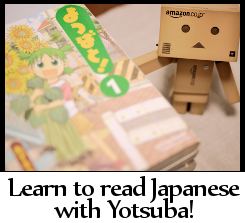Vocabulary:
- How to Learn Vocabulary
- Vocabulary Sources
- Types of Flashcards
- How to Make Word Cards
- How to Make Sentence Cards
- Studying Vocabulary in Anki
- Deleting Cards from Anki
How to Learn Vocabulary:
Learning vocabulary in this case comes down to three steps: Encounter new vocabulary, create flashcards, and study flashcards. When you come across a new word you look it up, understand it, and then make a flashcard for it and put it into your study program (such as Anki). By creating a flashcard and studying your deck daily, you will ensure that you retain knowledge of words. Spaced-repetition type programs will schedule reviews farther and farther out, so you shouldn't have an extreme build-up of cards over time.
⇧ Return to Top ⇧
Vocabulary Sources:
The best source of vocabulary to learn is Japanese media. Text media is particularly good, because it is very easy to search for words in a dictionary while reading. For beginners, manga or comics are especially useful, as you have pictures to help you understand context. Check out the Yotsubato! Reading Packs for a good place to get started.
In addition to media, some people like to use lists of common words. For an example of this, take a look at the Core 2000 Anki deck. In a similar thread, textbooks often go through very common vocabulary in their opening chapters. You could use example sentences and passages from a textbook as a resource for building your own Anki deck.
⇧ Return to Top ⇧
Types of Flashcards:
There are two kinds of flashcards that I use. The more simple flashcard is a Word Card. For this you simply make a flash card with the Japanese word on the front and the definition and reading on the back. These cards are really quick and easy to make. However, they don't really show context, so there is a second card format that you can use: the Sentence Card.
In a sentence card you look up example sentences (they can be found in most online dictionaries) and make the example sentence the front of the card. The back of the card will contain a translation of the sentence (again, most dictionaries will have it), the readings for each word, and the definition for each word. These cards take a bit longer to make, but can really help if you're having difficulty remembering a word.
⇧ Return to Top ⇧
How to make Word Cards:
As mentioned above, cards for a single word are very simple. On the front of the card, put the word in its kanji form (unless it doesn't have one). On the back, have the reading in kana and the definition in Japanese or English. There are a few examples below:
| Front | Back |
| 釣り | つり Fishing, angling |
| 父 | ちち Father |
| 詳しい |
くわしい 1)Detailed, accurate 2) Knowing very well, well informed |
⇧ Return to Top ⇧
How to make Sentence Cards:
For a sentence card you will need to first find an example sentence. There are several dictionary resources listed on the Learning Tools page that can help for this. You will then want to have definitions and readings for all words in the sentence and a translation of the sentence as a whole. You can quickly get definitions for all words using WWWJDIC's text glossing (or search individually).
For example:
| Front |
| 釣りとなると、私の父は誰よりも詳しい。 |
| Back |
|
釣り: つりfishing; angling となると (exp) where ... is concerned; when it comes to ...; 私の: わたしの my; mine 父: ちちfather 誰: だれwho よりも more than 詳しい (1) detailed; full; accurate; (2) knowing very well; well-acquainted; well-informed When it comes to fishing, nobody knows more than my father. |
⇧ Return to Top ⇧
Studying Vocabulary in Anki:
Setting limits on the number of new cards per day in Anki is a good idea. If you add a small, manageable number of cards per day and continue to add and review each day, then you will be able to remember and retain vocabulary over the long term and avoid getting overwhelmed with too many cards on any single day. Studying with Anki should be a supplement to immersion learning, so don't let it become your focus.
⇧ Return to Top ⇧
Deleting Cards from Anki:
Sometimes a card just needs to go. If you are consistently adding new cards to your deck, it's very possible for your daily reviews to eventually become too much. You don't want to devote all of your time with Japanese to studying Anki, so feel free to suspend or delete cards that you either know very well or that just won't stay in your memory. If a word is truly important, you will come across it again elsewhere, so don't worry too much about learning it at any single point.

